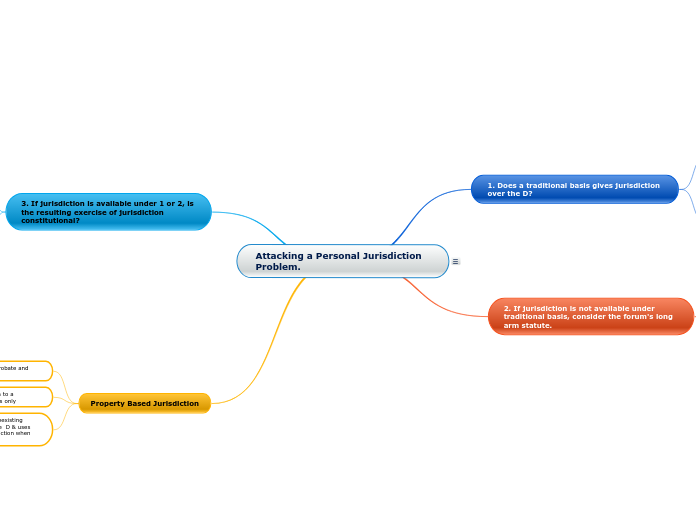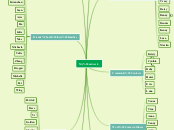Attacking a Personal Jurisdiction Problem.
First determine whether jurisdiction over the D exists because of a traditional basis.
If no traditional basis exists examine the forum's long-arm statute.
Finally if there is jurisdiction because of a traditional basis or a long-arm statute use the two-part contacts-plus-fairness test to determine whether exercising jurisdiction will violate defendant's constitutional right to due process.
Begin with general/specific jurisdiction distinction. Is the D has substantial contacts with the forum--jurisdiction may exist. If not the case must for the specific jurisdiction paradigm, and P's claim must "arise out of" or "relate to" defendant's forum contacts.
When assessing contacts, keep the following in mind:
1) For general jurisdiction, a great deal of contact is required.....fro specific jurisdiction much less is required.
2) The contacts that count the most are those purposefully established by the D or her agent....the only contact required is those of the D, there is no such requirement for the P.
3) Are the D's forum activities such that she should be able to anticipate being "haled into court" in the forum?
4) Finally, determine whether the D contacts have been established purposefully....if a manufacturer creates a steady stream of products into the forum, , it will be amenable to a product liability there....if the D merely deliver its products into the stream of commerce with knowledge that a few end up in the forum, jurisdiction probably will not exist.
Property Based Jurisdiction
attachment jurisdiction - P does not assert a preexisting claim of ownership but a personal claim against the D & uses the property as a device (hostage) to obtain jurisdiction when personal jurisdiction over the D is unavailable
Pennoyer v Neff
Pennoyer principle: a nonresident's land in the forum state can provide the basis for litigating a personal claim against the owner even though the claim was unrelated to the land and eve though the court lacked personal jurisdiction over the owner. NB the attachment must happen at the start of the action and not after rendering judgment as the Oregon Court did in Pennoyer v Neff--because the court did not seize the land at the beginning of the action it lacked jurisdiction (but this is no longer good law)
Note long-arm statutes has reduced the need for attachment jurisdiction
fairness concerns of attachment were addressed in Shaffer v Heitner (1977)
quasi-in rem - the P asserts a preexisting claim to a particular thing against certain named individuals only
in rem admiralty, forfeiture, eminent domain, probate and land title registration
3. If jurisdiction is available under 1 or 2, is the resulting exercise of jurisdiction constitutional?
b. Is the exercise of jurisdiction fair or reasonable?
World-Wide Volkswagen v Woodson 444 U.S. 286 (1980) - two part test requiring an assessment of both minimum contacts and fair play and substantial justice.--In order to assert jurisdiction, the D must have purposefully directed its activities toward the forum state.
Court held that the requirements are based on the Due Process Clause of the Fifth and 14th Amendment and in the requirements are justified by the principles of interstate federalism embodied in the Constitution but note been, the Court abandon this position in Insurance Corp of Ireland v Compaigne ed Bauxites De Guinee (1982) and held that the personal jurisdiction requirement protects the D 's liberty interest. In Calder v Jones (1984) the COurt rejected the argument that one reason for the requirement was the First Amendment Free Press concern - it rejected Jones the author and editior of the National Enquirer calim that exercising jurisdiction over them would violate the First Amendment (this matter is already covered by the state's substantive libel and slander laws
v. Will jurisdiction advance the shared interest of the several states in furthering substantive social poilicies?
iv, Will the jurisdiction further the inter-state judicial system's interest in the efficient resolution of controversies?
iii. Does the P has a convenient alternative forum for the claim?
Does the forum has an interest in adjudicating the case?
i. will the burden on the D be severe?
a. Does the D has minimum contact with the forum?
vi. Did the D product enter the state as part of a substantial stream?
v. Did the D purposefully establish contacts with the forum?
iv. Did the out of state D initiate the contact with the in state P or vice versa?
iii. Could the D anticipated being "haled into court" in the forum?
ii. Are the contacts relied upon to support jurisdiction those of the D or her agent?
i. Are the D's contacts sufficient to support the exercise of general jurisdiction?
2. If jurisdiction is not available under traditional basis, consider the forum's long arm statute.
b. If it is an Enumerated Act statute, does one of its sections apply here?
Typical enumerated acts are:
1) Transacting business within the state--can be satisfied by a single transaction and the D need not enter the state
2) Contracting to supply good or services within the state--the contract need not be executed within the state
3)Causing tortious injury in this state by an act or omission in the state--local-act-local-injury
4) Causing tortious injury in this state by an act or omission outside the state - foreign-act-local-injury. Note these provisions often contain clauses requiring additional affiliations between the D and the forum
a. If it is a CA-style statute proceed directly to the constitutional question (item 3)
1. Does a traditional basis gives jurisdiction over the D?
b. Corporations
ii. Is the D doing business in the forum?
i. Is the D incorporated in the forum?
a. Natural Persons
iii. Did the D consent to jurisdiction?
ii. Is the D a domiciliary of the forum?
i. Was the D served with process in the forum?









